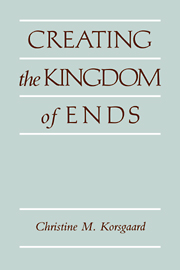Book contents
- Frontmatter
- Contents
- Introduction
- Abbreviations for Kant's works
- PART ONE KANT'S MORAL PHILOSOPHY
- PART TWO COMPARATIVE ESSAYS
- 8 Aristotle and Kant on the source of value
- 9 Two distinctions in goodness
- 10 The reasons we can share: An attack on the distinction between agent-relative and agent-neutral values
- 11 Skepticism about practical reason
- 12 Two arguments against lying
- 13 Personal identity and the unity of agency: A Kantian response to Parfit
- Bibliography
- Sources
- Other publications by the author
- Index
- Index of citations
9 - Two distinctions in goodness
Published online by Cambridge University Press: 05 June 2012
- Frontmatter
- Contents
- Introduction
- Abbreviations for Kant's works
- PART ONE KANT'S MORAL PHILOSOPHY
- PART TWO COMPARATIVE ESSAYS
- 8 Aristotle and Kant on the source of value
- 9 Two distinctions in goodness
- 10 The reasons we can share: An attack on the distinction between agent-relative and agent-neutral values
- 11 Skepticism about practical reason
- 12 Two arguments against lying
- 13 Personal identity and the unity of agency: A Kantian response to Parfit
- Bibliography
- Sources
- Other publications by the author
- Index
- Index of citations
Summary
In this paper I describe two distinctions in goodness which are often conflated, and try to show the importance of keeping them separate. The two distinctions in question are: the distinction between intrinsic and extrinsic goodness, and the distinction between ends or final goods, and means or instrumental goods.
It will help to begin by delineating the kind of value and the kind of judgment of value with which I am primarily concerned here. I take it that there are three primary categories of value with which the moral philosopher is concerned: namely, the rightness or justice of actions, policies, and institutions; the goodness of objects, purposes, lives, etc.; and the moral worth or moral goodness of characters, dispositions, or actions. My concern here is not with what constitutes moral worth or moral goodness but with the second category – with goodness as a feature of ordinary ends and purposes, states of affairs, objects, activities, and other things – that is, with the kind of goodness that marks a thing out as worthy of choice.
Within this category, we can distinguish, admittedly with some artificiality, three kinds of judgments of goodness that we make. We judge something to be good of its kind when we judge it to have the virtues appropriate to that kind. We may also judge something to be a good kind of thing, as when we say of friendship or books or health that they are good.
- Type
- Chapter
- Information
- Creating the Kingdom of Ends , pp. 249 - 274Publisher: Cambridge University PressPrint publication year: 1996
- 29
- Cited by



